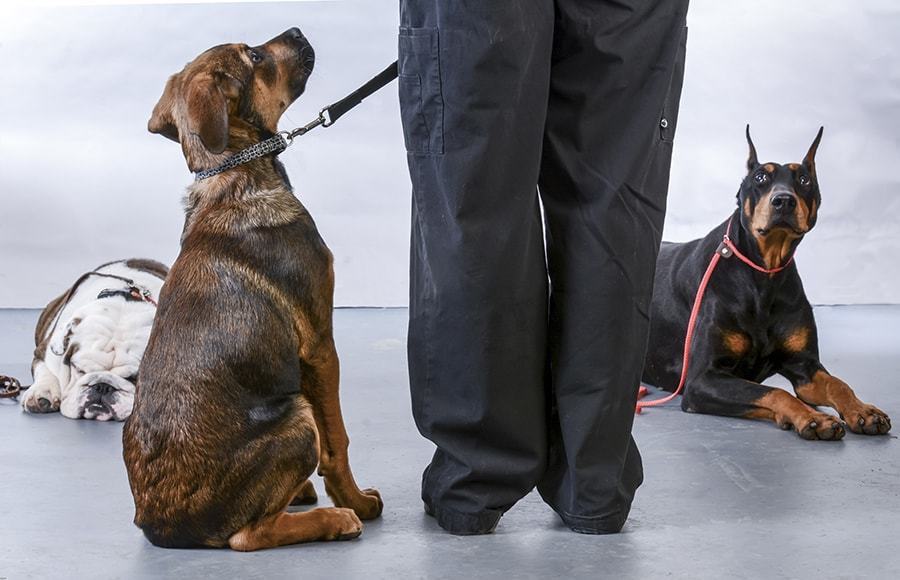“This post contains affiliate links, and I will be compensated if you make a purchase after clicking on my links.”
Hillsborough County commissioners today voted 5-to-2 in favor of a groundbreaking ordinance that regulates the dog training industry in the county. This bill is the first of its kind in the nation and one that, supporters hope, will pave the way for other counties and even states to enact similar laws.

Dubbed the “Truth-in-Training” bill, and better known as Sarge’s Law, the new ordinance regulates the dog training industry in the county by imposing several licensing and regulatory requirements on dog trainers in an effort to help pet owners make better informed decisions regarding their dog’s care and training.
Sarge was a happy, healthy Shih Tzu/Pekingese puppy whose loving parents sent him to doggy day care each day as part of their efforts to give him the best life possible. Sarge’s owner, Lorie Childers, opted to use the day care’s training services to teach her little dog to walk nicely on a leash. During that session, the trainer clamped his hand over Sarge’s mouth while grabbing the 8-pound puppy’s neck with his other hand. Sarge died in his owner’s arms immediately following the incident.
At Childers’ urging, Hillsborough County Commissioner Al Higginbotham began looking into the dog training industry and was shocked at the lack of oversight.
“I’ve learned through process of research when this came to my attention that there are no minimum standards or proper oversight for dog trainers,” he said.
In a Wednesday morning commissioner meeting, 61 members of the public spoke for 2-minutes each – both in support and in opposition of the proposed ordinance which sets forth regulations for dog trainers that includes requiring dog trainers to be licensed and carry liability insurance of at least $100,000. Trainers must undergo federal and local background checks and those found to have been convicted of animal cruelty will be barred from training within Hillsborough County.
Those speaking in opposition of the bill seemed to have misunderstood the scope of the proposed law, with many self-proclaimed trainers saying they sometimes need to use force- and fear-based training to rehabilitate or train certain dogs.
The bill, however, does NOT regulate the specifics of training, which methods are acceptable, or which tools and techniques can be used in training. What it DOES do, is require dog trainers to clearly discuss with potential clients how they intend to train a dog with a written training plan signed by both the trainer and client.
As written, the training plan is defined as a “written plan that clearly outlines the name of the dog, the dog’s age, the dog’s breed, the individuals who will be responsible for the training and care of the dog, and the specific behaviors or obedience training needs to be addressed. The Training Plan shall also include the specific methods and/or techniques, the equipment that would be used in Dog Training, a description of any potential physical corrections or Dog Training techniques that may be used in the correction process, any deprivation techniques that may be used, and any risks involved, if any. In addition, the Training Plan shall provide a written cost estimate of all fees and costs (including care and boarding fees, where applicable) associated with the Training Plan and the level of involvement required by the Consumer. If the Consumer provides special health or feeding instructions for the dog, those instructions shall be attached to the Training Plan and become incorporated into the Training Plan.”
Further, the law requires that incidents of injury or death must be reported to the regulating department within 24 hours with those reports made available to the public in order to make an informed decision in choosing a dog trainer.
Would you support similar laws in your own county or state? Why or why not? Weigh in with a comment below!


















Percy Blok
says:More nanny state BS. Personal responsibility by the owner to investigate any vendor. Hillsborough county dhould start by looking into the training methods of their police K9 working dogs. Not goingbto find clickerscand treat bags on any cops. Walk on a leash and dog dies in arms…. more to the story than biased article reveals. Animal cruelty is already on tge books. This animal was abused with training tools. PERIOD.
Rick hihath
says:Unfortunately most selected law makers aren’t intelligent enough to address solutions for truelly urgent needs such as economics housing medical issues and employment thus hiding their inadequacies by dwelling on ridiculous public control ordinances ect. ….this poor country is being legislated and taxed and licenced to death due to incompetent law makers and special interest groups persuasion
Peggy Richter
says:A written contract (which is what this is) is fine as far as it goes. Trainers should perhaps need to provide some evidence of success — I don’t care about certificates, if they are training fluffy to walk on a lead, have they gotten cgc, or rally or obedience titles on a variety of dogs? Have their students? Training for herding? How many dogs have they titled in akc or asca or ahba or placed in open usbcha? But let’s go further! Politicians make lots of promises too. Let’s have them sign a written contract as to what they will or won’t do when elected with significant money penalties for failing to comply. We might end the deficit in five years.
Gayl
says:I do not support this. It is for making the county money and insurance richer. It will give an opening for eroding first trainers right and work it though all animal owner ship. It is just a gate way. If these counties want to put dog trainers out of business put these burdens on them. Publish questions to ask a trainer. I know many trainer who already give more than what any one pays for. I wonder what the filing fee will be?
Ramona Woodruff
says:I would not endorse such a program. It would start out with good intentions and bit by bit, take away the rightrs of breeders, owners and trainers based on a few incidents that may or may not occur. The pet industry is already so regulated, we do not need to impose more regulations. I can see making persons who abuse, neglect or injure animals paying for the damage. Three incidents and they can no longer train. To impose $100,000 insurance policy would put most trainers out of business. How much should one person get for the loss of their pet is questionable, however $100,000 is way too extreme. Show animals such as horses rarely get that much for their loss. A dog should be a reasonable amount not to exceed $10,000.
Jennifer Bauer
says:If a basic insurance policy like that would put a trainer out of business, then to be honest they’re not having a ton of success as a trainer. Insurance is a basic business expense.
The pet industry is not regulated at all.
Larry Whitney
says:I agree that trainers should carry insurance. It’s just that 100,000 seems arbitrary. What was the deciding factor used by this county for that number?
Yes, this is the first step of many that need to be made in the dog training industry. We need a standardized training pprogram that all trainers need to complete before they can train someone else’s dog.
Catherine Z
says:This is truly wonderful! For most dog owners, pets are valued family members, yet there are no regulations for people who care for them. It only makes sense. Kudos, TAMPA!!!!
Sherry W.
says:The very best of dog trainers train a very limited number of dogs, and are NOT highly paid. They can’t afford the insurance required by this ordinance. I support the other requirements of the ordinance, but the insurance requirement will force out the small trainers who focus on high quality training, and leave only the large businesses that are willing to choose quantity over quality. Bad idea. Dog owners simply need to ask for and check references before they choose a trainer.
Tim Steele
says:I would absolutely support such a law in my area. Have you noticed how medical practitioners and pharmaceutical companies are required to be transparent about risks when using their products/services? That’s a good model for dog trainers. As it stands today, anyone can call themselves a trainer and can use any method whatsoever without informing the dog owners in advance about the potential risks and unintended fallout of their choice of training approaches. Further, I’m convinced that most owners will reject the use of pain, fear, or intimidation which are used by “balanced” dog trainers if they are fully informed. Of course, these trainers will come up with language which makes their methods sound safe and pleasant. But putting things in writing, in advance, is a first step toward holding unqualified trainers responsible and moving to equally effective, safe, humane, and scientifically sound force-free training methods.
nancy dick
says:what a sham,
Yes, most definitely. I am professional dog trainer and certified in behavior through respected organization/s.
Liz
says:Never! This is a PETA backed initiative. Hillsborough County has long standing kennel regulations that have not been enforced in over 10 years that would have solved the problem. All the reported cases of animals being harmed or injured were at boarding/daycare facilities.
Any experienced dog trainer will tell you that no matter how long you’ve been training dogs the unexpected can happen. When it does it needs to be addressed immediately. Simply putting the dog away because you didn’t put that unexpected issue on paper can make the issue even harder to address.
Many experienced trainers will also tell you that purely positive training doesn’t work for every dog. Well regarded, nationally respected trainers will tell you this. If you want to actually educate yourself about it a great place to start is here:
positively.com/victorias-blog/why-im-not-and-never-have-been-a-purely-positive-dog-trainer/
Good points, Liz. Unexpected circumstances ARE addressed in the bill, specifically in the Written Training Plan that is reviewed and signed by both the trainer and dog owner. There are multiple sections that address possible use of force and handling methods not specifically discussed in the event it is necessary for the dog’s safety or the safety of other animals or people.
Additionally, the law doesn’t specify which methods or tools can be used in training. It ONLY requires trainers to be transparent and forthcoming in the methods they choose to use, including non-positive or aversive methods.
Heddie
says:Yes. This is awesome. Reputable dog trainers already do this if they have been properly educated. This is s step in the right direction.
I am a dog Trainer of 20 years and I do mainly rehab of aggressive dogs and I don’t need to use force. Only bad trainers do.
katie
says:How do you handle a dog who comes up the leash on you?
BLS
says:Sadly, ill informed commissioners passed legislation inspired by an owner who failed to do her due diligence in selecting a trainer. Instead, she foolishly picked her doggie day care center to do training. An owner as careless as that should be the one regulated against having a dog, not impose burdens on responsible trainers. So sad, the commissioners couldn’t figure that out!
When the doggy day care presents themselves as trainers, how would the dog’s owner know otherwise? If this law were in place before Sarge’s death, the owner would have at the very least, known the “trainer” was licensed and would know which methods would be used to train.